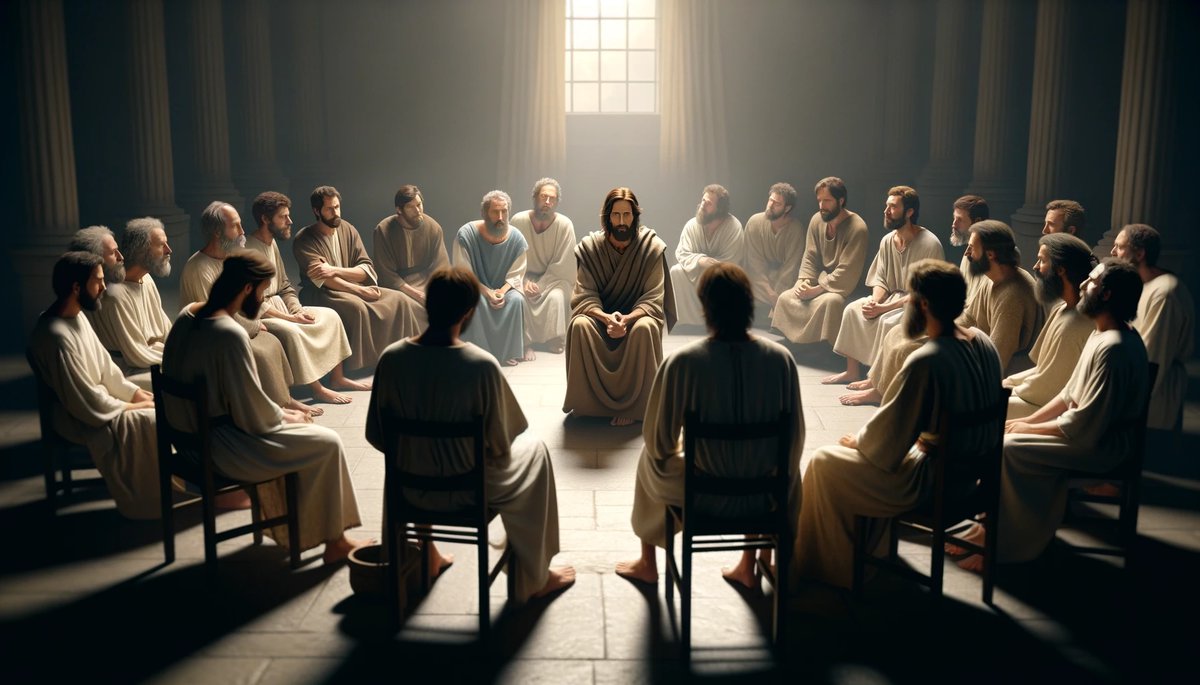Home>Theology and Spirituality>Who Got John The Baptist Head


Theology and Spirituality
Who Got John The Baptist Head
Published: February 23, 2024
Ericka Andersen, an editor at Christian.net, expertly merges digital strategy with content creation, focusing on faith and societal issues. Her communication skills enhance the platform's engaging narratives, fostering meaningful dialogue on belief's impact on society.
Discover the intriguing story of John the Baptist's beheading and its significance in theology and spirituality. Explore the historical and religious context behind this event.
(Many of the links in this article redirect to a specific reviewed product. Your purchase of these products through affiliate links helps to generate commission for Christian.net, at no extra cost. Learn more)
Table of Contents
Introduction
The story of John the Baptist's beheading is a poignant and tragic episode in the New Testament, shedding light on the complex dynamics of power, influence, and morality during the time of Jesus. This narrative, found in the Gospels of Matthew (14:1-12) and Mark (6:14-29), captivates readers with its dramatic portrayal of political intrigue, personal vendettas, and unwavering faith.
The account of John the Baptist's beheading unfolds against the backdrop of the reign of Herod Antipas, a tetrarch of Galilee and Perea. Herod Antipas, a son of Herod the Great, held significant political authority in the region, and his actions and decisions carried weighty implications. His rule was marked by a complex interplay of Roman influence, Jewish customs, and personal ambitions, setting the stage for the events that led to the demise of John the Baptist.
As we delve into the circumstances surrounding John the Baptist's execution, it becomes evident that the pivotal roles of Herod Antipas and Herodias, his wife, were instrumental in shaping the tragic outcome. Their actions and motivations, intertwined with the teachings and boldness of John the Baptist, form a compelling narrative that continues to resonate with readers across generations.
The story of John the Baptist's beheading serves as a sobering reminder of the clash between righteousness and worldly powers, the consequences of unwavering conviction, and the enduring legacy of those who fearlessly proclaim truth in the face of adversity. This narrative invites us to explore the complexities of human nature, the pursuit of justice, and the enduring impact of individuals who stand firm in their beliefs, even in the face of formidable opposition.
Read more: Who Asked For Head Of John Baptist
The Role of Herod Antipas
Herod Antipas, a significant figure in the New Testament, held the title of tetrarch, governing the regions of Galilee and Perea during the time of Jesus. As a son of Herod the Great, he inherited a complex legacy of political power, Roman influence, and familial dynamics. His role as a ruler was marked by a delicate balance between maintaining Roman favor and appeasing Jewish customs and sensibilities.
Herod Antipas' reign was characterized by a shrewd navigation of political alliances and strategic decisions aimed at consolidating his authority. His interactions with Roman authorities, particularly his efforts to secure and maintain favorable relations with the Roman Empire, underscored the intricate web of political considerations that shaped his governance. This delicate dance between asserting regional autonomy and yielding to Roman oversight defined the parameters within which Herod Antipas operated.
In the context of John the Baptist's story, Herod Antipas emerges as a central figure whose actions and decisions set the stage for the tragic events that unfolded. His marriage to Herodias, his brother's wife, not only sparked public outrage but also laid the foundation for the personal vendetta that ultimately led to John the Baptist's execution. The complexities of Herod Antipas' personal life, entangled with political ramifications and public perception, added layers of tension and moral ambiguity to the narrative.
Furthermore, Herod Antipas' encounter with John the Baptist revealed the clash between his political calculations and the prophetic challenges to his moral conduct. John the Baptist's outspoken condemnation of Herod Antipas' marriage to Herodias, despite its political expediency, posed a direct threat to the tetrarch's authority and personal life. This confrontation exemplified the collision of spiritual conviction and political expediency, highlighting the profound implications of John the Baptist's message on the ruler's conscience and public image.
Herod Antipas' role in the narrative of John the Baptist's beheading serves as a compelling study of the complexities of leadership, the interplay of personal choices and political consequences, and the enduring resonance of moral dilemmas. His decisions and their far-reaching effects underscore the intricate interweaving of power, morality, and the human condition, inviting reflection on the timeless tensions between earthly dominion and spiritual truths.
The Influence of Herodias
Herodias, the wife of Herod Antipas, played a pivotal role in the tragic narrative of John the Baptist's beheading. Her presence and influence added a layer of complexity and personal vendetta to the unfolding events, shaping the trajectory of the story in profound ways.
Herodias' influence extended beyond her position as the wife of Herod Antipas; her familial connections and personal ambitions intertwined with the political landscape, amplifying the tensions that ultimately led to John the Baptist's execution. Her marriage to Herod Antipas, her former husband's brother, not only defied Jewish law but also fueled public outrage and condemnation. This defiance of societal norms and religious principles set the stage for the collision between personal desires and moral accountability.
Furthermore, Herodias' role as a mother to her daughter, Salome, added another dimension to the narrative. The infamous dance of Salome, manipulated by her mother's vengeful intentions, became a catalyst for John the Baptist's demise. Herodias' influence over her daughter, leveraging her to fulfill a vindictive agenda, underscored the extent of her determination to silence the prophetic voice that had challenged her choices and lifestyle.
Herodias' influence, characterized by a potent blend of personal ambition, familial entanglements, and a desire for retribution, cast a shadow over the events leading to John the Baptist's beheading. Her calculated decisions and unwavering pursuit of vengeance against John the Baptist exemplified the collision of personal vendettas and political power, culminating in a tragic and irreversible outcome.
The influence of Herodias serves as a poignant reminder of the intricate interplay between personal motivations and the exercise of power, the enduring consequences of unchecked ambition, and the profound impact of individual choices on the course of history. Her presence in the narrative of John the Baptist's beheading illuminates the complexities of human nature, the enduring legacy of personal vendettas, and the sobering realities of wielding influence in the corridors of power.
In summary, Herodias' influence, marked by personal vendettas and calculated maneuvers, reverberates through the annals of history as a cautionary tale of the potent ramifications of unchecked ambition and the enduring consequences of leveraging influence for vengeful ends.
The Execution of John the Baptist
The execution of John the Baptist stands as a harrowing testament to the collision of power, personal vendettas, and unwavering faith. The sequence of events leading to John the Baptist's demise unfolds with tragic inevitability, propelled by a convergence of political calculations and vengeful agendas.
Following Herod Antipas' imprisonment of John the Baptist, a fateful chain of events was set in motion. The tetrarch's decision to incarcerate the outspoken prophet, driven by a combination of personal offense and political considerations, cast a shadow of uncertainty over John the Baptist's fate. Despite his imprisonment, John the Baptist's unwavering commitment to truth and righteousness remained unyielding, serving as a beacon of moral clarity in the midst of political machinations.
The pivotal moment leading to John the Baptist's execution arose during a banquet held by Herod Antipas, where the infamous dance of Herodias' daughter, Salome, captivated the assembled guests. Herod's rash vow, prompted by the dance, led to the tragic request for John the Baptist's head on a platter. This impulsive pledge, driven by a potent blend of pride, public spectacle, and personal vendetta, sealed John the Baptist's fate and set in motion the irreversible decree of execution.
The solemn procession of events that followed, culminating in the beheading of John the Baptist, reverberates with profound implications. The clash between Herod Antipas' political calculations and the unwavering conviction of John the Baptist underscores the enduring struggle between earthly dominion and spiritual truth. The execution of John the Baptist stands as a stark reminder of the consequences of wielding power without moral restraint and the enduring legacy of those who fearlessly uphold their beliefs, even in the face of formidable opposition.
In the aftermath of John the Baptist's execution, a profound sense of loss and injustice permeated the collective consciousness. The prophet's unwavering commitment to righteousness, his bold proclamation of truth, and his steadfast adherence to his principles left an indelible mark on the hearts of those who bore witness to his unwavering faith. The execution of John the Baptist serves as a poignant reminder of the enduring resonance of courage in the face of adversity and the timeless struggle between the forces of darkness and the unwavering light of truth.
The narrative of John the Baptist's execution stands as a testament to the enduring legacy of those who stand firm in their convictions, even in the face of formidable opposition. It serves as a sobering reminder of the clash between righteousness and worldly powers, the consequences of unwavering conviction, and the enduring impact of individuals who fearlessly proclaim truth in the face of adversity.
Conclusion
The tragic narrative of John the Baptist's beheading resonates with timeless themes of power, influence, and unwavering faith. The convergence of political intrigue, personal vendettas, and moral conviction unfolds with gripping intensity, leaving an indelible imprint on the annals of history. The roles of Herod Antipas and Herodias, intertwined with the prophetic voice of John the Baptist, illuminate the complexities of human nature, the enduring consequences of unchecked ambition, and the timeless clash between earthly dominion and spiritual truth.
The story of John the Baptist's beheading serves as a poignant reminder of the enduring legacy of those who fearlessly uphold their beliefs, even in the face of formidable opposition. John the Baptist's unwavering commitment to righteousness, his bold proclamation of truth, and his steadfast adherence to his principles leave an indelible mark on the collective consciousness, inspiring reflection on the enduring resonance of courage in the face of adversity.
Furthermore, the narrative invites contemplation on the profound implications of wielding power without moral restraint. The collision of personal vendettas, political calculations, and the unwavering conviction of John the Baptist underscores the enduring struggle between the forces of darkness and the unwavering light of truth. The consequences of Herod Antipas and Herodias' unchecked ambition, culminating in the tragic execution of John the Baptist, stand as a sobering reminder of the potent ramifications of leveraging influence for vengeful ends.
In conclusion, the story of John the Baptist's beheading transcends its historical context, offering timeless insights into the complexities of human nature, the enduring legacy of unwavering faith, and the sobering realities of wielding power without moral restraint. It beckons readers to ponder the enduring resonance of courage in the face of adversity, the consequences of unchecked ambition, and the timeless clash between earthly dominion and spiritual truth. The narrative of John the Baptist's beheading stands as a testament to the enduring legacy of those who stand firm in their convictions, leaving an indelible mark on the hearts of generations to come.















